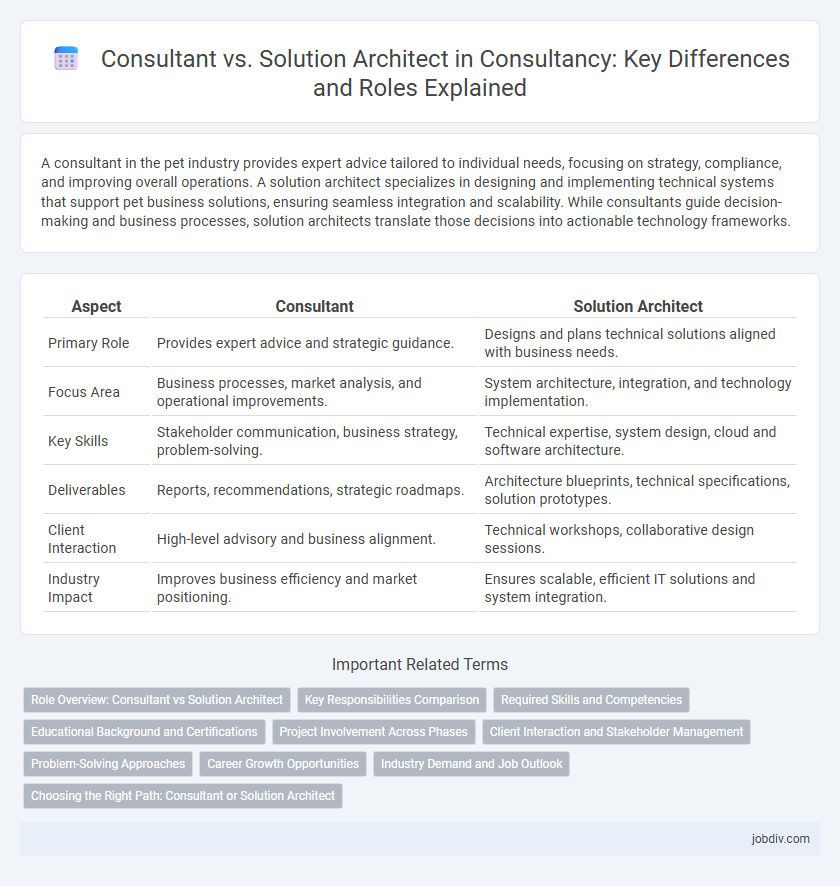A consultant in the pet industry provides expert advice tailored to individual needs, focusing on strategy, compliance, and improving overall operations. A solution architect specializes in designing and implementing technical systems that support pet business solutions, ensuring seamless integration and scalability. While consultants guide decision-making and business processes, solution architects translate those decisions into actionable technology frameworks.
Table of Comparison
| Aspect | Consultant | Solution Architect |
|---|---|---|
| Primary Role | Provides expert advice and strategic guidance. | Designs and plans technical solutions aligned with business needs. |
| Focus Area | Business processes, market analysis, and operational improvements. | System architecture, integration, and technology implementation. |
| Key Skills | Stakeholder communication, business strategy, problem-solving. | Technical expertise, system design, cloud and software architecture. |
| Deliverables | Reports, recommendations, strategic roadmaps. | Architecture blueprints, technical specifications, solution prototypes. |
| Client Interaction | High-level advisory and business alignment. | Technical workshops, collaborative design sessions. |
| Industry Impact | Improves business efficiency and market positioning. | Ensures scalable, efficient IT solutions and system integration. |
Role Overview: Consultant vs Solution Architect
Consultants specialize in analyzing client needs, providing strategic advice, and ensuring business objectives align with technology solutions. Solution Architects design and oversee the implementation of complex IT systems, translating business requirements into scalable technical architectures. Both roles collaborate to bridge business goals with technological execution, with consultants focusing on high-level strategy and solution architects on detailed design and deployment.
Key Responsibilities Comparison
Consultants analyze client needs and provide strategic advice to improve business processes, ensuring alignment with organizational goals. Solution Architects design, develop, and oversee the implementation of technical solutions, translating requirements into scalable system architectures. While consultants focus on advising and stakeholder engagement, solution architects emphasize technical leadership and integration across platforms.
Required Skills and Competencies
Consultants must excel in client communication, problem-solving, and business analysis to identify organizational needs and deliver strategic advice. Solution Architects require deep technical expertise, system design capabilities, and proficiency in integrating complex software solutions to ensure scalable and efficient architecture. Both roles demand strong project management skills, but Solution Architects typically need advanced knowledge of cloud platforms, software development, and infrastructure technologies.
Educational Background and Certifications
Consultants in the consultancy field often hold degrees in business, management, or related disciplines, complemented by certifications such as PMP or Six Sigma to validate project management and process improvement skills. Solution Architects typically possess a strong technical educational background, including degrees in computer science or engineering, alongside certifications like AWS Certified Solutions Architect or TOGAF that demonstrate expertise in designing complex IT systems. Both roles require continuous professional development to stay current with industry standards and emerging technologies.
Project Involvement Across Phases
Consultants typically engage early in projects, focusing on needs assessment, stakeholder alignment, and defining business requirements to ensure strategic objectives are clear. Solution Architects are heavily involved throughout design, development, and implementation phases, translating business needs into technical blueprints and ensuring architectural integrity. Their collaboration across project lifecycles ensures solutions are feasible, scalable, and aligned with client goals.
Client Interaction and Stakeholder Management
Consultants excel in client interaction by understanding business needs and delivering strategic advice that aligns with organizational goals. Solution Architects focus on stakeholder management through technical collaboration, ensuring proposed architectures meet both business and IT requirements. Effective communication skills are crucial for both roles to bridge gaps between clients, technical teams, and stakeholders, driving project success.
Problem-Solving Approaches
Consultants primarily focus on identifying client challenges and offering strategic recommendations to improve business processes, leveraging industry insights and expertise. Solution Architects design and implement technical solutions that directly address specific problems, ensuring system integration and scalability within the client's technology landscape. Both roles employ analytical problem-solving but differ in scope, with Consultants emphasizing business strategy and Solution Architects centering on technical execution.
Career Growth Opportunities
A Consultant typically focuses on client needs, business processes, and strategic guidance, offering diverse project exposure that enhances stakeholder management skills. A Solution Architect specializes in designing technical solutions, deepening expertise in system architecture, integration, and emerging technologies. Both roles provide strong career growth opportunities, with Consultants often progressing to senior advisory or management positions, while Solution Architects can advance to enterprise architecture or technical leadership roles.
Industry Demand and Job Outlook
Consultants possess broad expertise in analyzing business needs and recommending strategic improvements, while Solution Architects specialize in designing and implementing technical systems aligned with business goals. Industry demand for Solution Architects is rapidly increasing, driven by digital transformation initiatives and the need for integrated technology frameworks across sectors like finance, healthcare, and manufacturing. Job outlook projections indicate a stronger growth rate for Solution Architects compared to general Consultants, reflecting the critical role of technical architecture in modern enterprise solutions.
Choosing the Right Path: Consultant or Solution Architect
Choosing the right path between Consultant and Solution Architect depends on your career goals and expertise in consultancy. Consultants focus on analyzing client needs, managing projects, and providing strategic advice, while Solution Architects specialize in designing and implementing technical solutions tailored to business requirements. Understanding your strengths in client interaction or technical design helps determine whether to pursue consultancy or solution architecture roles effectively.
Consultant vs Solution Architect Infographic

 jobdiv.com
jobdiv.com